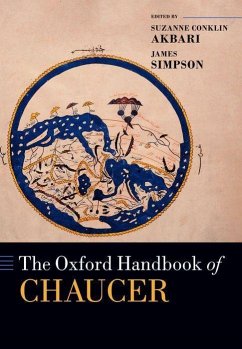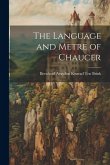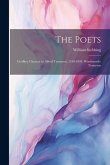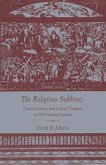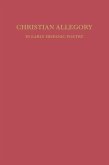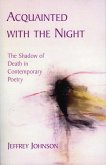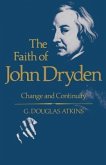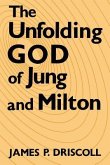The Oxford Handbook of Chaucer
Herausgeber: Conklin Akbari, Suzanne; Simpson, James
The Oxford Handbook of Chaucer
Herausgeber: Conklin Akbari, Suzanne; Simpson, James
- Broschiertes Buch
- Merkliste
- Auf die Merkliste
- Bewerten Bewerten
- Teilen
- Produkt teilen
- Produkterinnerung
- Produkterinnerung
This Handbook addresses Chaucer's poetry in the context of several disciplines, including late medieval philosophy and science, Mediterranean culture, comparative European literature, vernacular theology, and popular devotion.
Andere Kunden interessierten sich auch für
![The Language and Metre of Chaucer The Language and Metre of Chaucer]() Bernhard Aegidius Konrad Ten BrinkThe Language and Metre of Chaucer24,99 €
Bernhard Aegidius Konrad Ten BrinkThe Language and Metre of Chaucer24,99 €![The Poets: Geoffrey Chaucer to Alfred Tennyson, 1340-1892: Wordsworth-Tennyson The Poets: Geoffrey Chaucer to Alfred Tennyson, 1340-1892: Wordsworth-Tennyson]() William StebbingThe Poets: Geoffrey Chaucer to Alfred Tennyson, 1340-1892: Wordsworth-Tennyson26,99 €
William StebbingThe Poets: Geoffrey Chaucer to Alfred Tennyson, 1340-1892: Wordsworth-Tennyson26,99 €![The Religious Sublime The Religious Sublime]() David B MorrisThe Religious Sublime27,99 €
David B MorrisThe Religious Sublime27,99 €![Christian Allegory in Early Hispanic Poetry Christian Allegory in Early Hispanic Poetry]() David William FosterChristian Allegory in Early Hispanic Poetry22,99 €
David William FosterChristian Allegory in Early Hispanic Poetry22,99 €![Acquainted with the Night Acquainted with the Night]() Jeffrey JohnsonAcquainted with the Night11,99 €
Jeffrey JohnsonAcquainted with the Night11,99 €![The Faith of John Dryden The Faith of John Dryden]() George Douglas AtkinsThe Faith of John Dryden22,99 €
George Douglas AtkinsThe Faith of John Dryden22,99 €![The Unfolding God of Jung and Milton The Unfolding God of Jung and Milton]() James P DriscollThe Unfolding God of Jung and Milton27,99 €
James P DriscollThe Unfolding God of Jung and Milton27,99 €-
-
-
This Handbook addresses Chaucer's poetry in the context of several disciplines, including late medieval philosophy and science, Mediterranean culture, comparative European literature, vernacular theology, and popular devotion.
Hinweis: Dieser Artikel kann nur an eine deutsche Lieferadresse ausgeliefert werden.
Hinweis: Dieser Artikel kann nur an eine deutsche Lieferadresse ausgeliefert werden.
Produktdetails
- Produktdetails
- Verlag: Oxford University Press
- Seitenzahl: 688
- Erscheinungstermin: 30. Oktober 2023
- Englisch
- Abmessung: 234mm x 185mm x 56mm
- Gewicht: 1179g
- ISBN-13: 9780198890560
- ISBN-10: 0198890567
- Artikelnr.: 68056275
- Herstellerkennzeichnung
- Libri GmbH
- Europaallee 1
- 36244 Bad Hersfeld
- gpsr@libri.de
- Verlag: Oxford University Press
- Seitenzahl: 688
- Erscheinungstermin: 30. Oktober 2023
- Englisch
- Abmessung: 234mm x 185mm x 56mm
- Gewicht: 1179g
- ISBN-13: 9780198890560
- ISBN-10: 0198890567
- Artikelnr.: 68056275
- Herstellerkennzeichnung
- Libri GmbH
- Europaallee 1
- 36244 Bad Hersfeld
- gpsr@libri.de
Suzanne Conklin Akbari is Director of the Centre for Medieval Studies at the University of Toronto, and was educated at Johns Hopkins and Columbia. She has written books on optics and allegory (Seeing Through the Veil) and European views of Islam and the Orient (Idols in the East), and edited collections on travel literature (Marco Polo), Mediterranean Studies (A Sea of Languages), and somatic histories (The Ends of the Body). James Simpson is Donald P. and Katherine B. Loker Professor of English at Harvard University. He was formerly Professor of Medieval and Renaissance English at the University of Cambridge. His most recent books are Reform and Cultural Revolution, being volume 2 in the Oxford English Literary History (Oxford University Press, 2002); Burning to Read: English Fundamentalism and its Reformation Opponents (Harvard University Press, 2007), and Under the Hammer: Iconoclasm in the Anglo-American Tradition (Oxford University Press, 2010).
* Introduction: Placing the Past
* Part 1:Chaucer in the Mediterranean Frame
* 1: Peter Brown: Chaucer's Travels for the Court
* 2: Matthew Giancarlo: Chaucer and Contemporary Courts of Law and
Politics: House, Law, Game
* 3: Jonathan Hsy: At Home in the 'Countour-Hous': Inhabiting Space on
Chaucer's Polyglot Dwellings
* 4: Kellie Robertson: Labour and Time
* 5: Alexandra Gillespie: Books and Booklessness in Chaucer's England
* 6: Martha Rust: The Role of the Scribe: Genius of the Book
* 7: James Simpson: 'Gaufred, deere maister soverain': Chaucer and
Rhetoric
* Part 2: Chaucer in the Mediterranean Frame
* 8: Steven F. Kruger: Anti-Judaism / Anti-Semitism and the Structures
of Chaucerian Thought
* 9: Ruth Nisse: 'O Hebraic People!' English Jews and the
Twelfth-Century Literary Scene
* 10: Karla Mallette: The Hazards of Narration: Frame-Tale Technologies
and the Oriental Tale
* 11: Suzanne M. Yeager: Fictions of Espionage: Performing Pilgrim and
Crusader Identities in the Age of Chaucer
* Part 3: Chaucer in the European Frame
* 12: Jamie C. Fumo: Ovid: Artistic Identity and Intertextuality
* 13: Marilynn Desmond: Chaucer and the Textualities of Troy
* 14: David F. Hult: The Romance of the Rose: Allegory and Lyric Voice
* 15: Deborah McGrady: Challenging the Patronage Paradigm:
Late-Medieval Francophone Writers and the Poet-Prince Relationship
* 16: Martin Eisner: Dante and the Author of the Decameron: Love,
Literature, and Authority in Boccaccio
* 17: Warren Ginsberg: Boccaccio's Early Romances
* 18: Ronald Martinez: Chaucer's Petrarch: 'enlumnyed ben they'
* 19: David L. Pike: Dante and the Medieval City: How the Dead Live
* 20: Suzanne Conklin Akbari: Historiography: Nicholas Trevet's
Transnational History
* Part 4: Philosophy and Science in the Universities
* 21: Rita Copeland: Grammar and Rhetoric c. 1100-c. 1400
* 22: Fabienne Michelet and Martin Pickavé: Philosophy, Logic, and
Nominalism
* 23: Eleanor Johnson: The Poetics of Trespass and Duress: Chaucer and
the Fifth Inn of Court
* 24: E. Ruth Harvey: Medicine and Science in Chaucer's Day
* 25: Edith Dudley Sylla: Logic and Mathematics. The Oxford Calculators
* Part 5: Christian Doctrine and Religious Heterodoxy
* 26: Stephen E. Lahey: Wycliffism and its After-Effects
* 27: Kathryn Kerby-Fulton, Melissa Mayus, and Katie Bugyis:
Anticlericalism, Inter-clerical Polemic and Theological Vernaculars
* 28: Denise Despres: Chaucer as Image-Maker
* Part 6: The Chaucerian Afterlife
* 29: Jeffrey Jerome Cohen: Geographesis, or the Afterlife of Britain
in Chaucer
* 30: T. Matthew N. McCabe: Vernacular Authorship and Public Poetry:
John Gower
* 31: Anthony Bale: Lydgate's Chaucer
* 32: Jonathan Newman: Dialogism in Hoccleve
* 33: Iain MacLeod Higgins: Old Books and New Beginnings North of
Chaucer: Revisionary Reframings in the Kingis Quair and the
Testament of Cresseid
* Part 1:Chaucer in the Mediterranean Frame
* 1: Peter Brown: Chaucer's Travels for the Court
* 2: Matthew Giancarlo: Chaucer and Contemporary Courts of Law and
Politics: House, Law, Game
* 3: Jonathan Hsy: At Home in the 'Countour-Hous': Inhabiting Space on
Chaucer's Polyglot Dwellings
* 4: Kellie Robertson: Labour and Time
* 5: Alexandra Gillespie: Books and Booklessness in Chaucer's England
* 6: Martha Rust: The Role of the Scribe: Genius of the Book
* 7: James Simpson: 'Gaufred, deere maister soverain': Chaucer and
Rhetoric
* Part 2: Chaucer in the Mediterranean Frame
* 8: Steven F. Kruger: Anti-Judaism / Anti-Semitism and the Structures
of Chaucerian Thought
* 9: Ruth Nisse: 'O Hebraic People!' English Jews and the
Twelfth-Century Literary Scene
* 10: Karla Mallette: The Hazards of Narration: Frame-Tale Technologies
and the Oriental Tale
* 11: Suzanne M. Yeager: Fictions of Espionage: Performing Pilgrim and
Crusader Identities in the Age of Chaucer
* Part 3: Chaucer in the European Frame
* 12: Jamie C. Fumo: Ovid: Artistic Identity and Intertextuality
* 13: Marilynn Desmond: Chaucer and the Textualities of Troy
* 14: David F. Hult: The Romance of the Rose: Allegory and Lyric Voice
* 15: Deborah McGrady: Challenging the Patronage Paradigm:
Late-Medieval Francophone Writers and the Poet-Prince Relationship
* 16: Martin Eisner: Dante and the Author of the Decameron: Love,
Literature, and Authority in Boccaccio
* 17: Warren Ginsberg: Boccaccio's Early Romances
* 18: Ronald Martinez: Chaucer's Petrarch: 'enlumnyed ben they'
* 19: David L. Pike: Dante and the Medieval City: How the Dead Live
* 20: Suzanne Conklin Akbari: Historiography: Nicholas Trevet's
Transnational History
* Part 4: Philosophy and Science in the Universities
* 21: Rita Copeland: Grammar and Rhetoric c. 1100-c. 1400
* 22: Fabienne Michelet and Martin Pickavé: Philosophy, Logic, and
Nominalism
* 23: Eleanor Johnson: The Poetics of Trespass and Duress: Chaucer and
the Fifth Inn of Court
* 24: E. Ruth Harvey: Medicine and Science in Chaucer's Day
* 25: Edith Dudley Sylla: Logic and Mathematics. The Oxford Calculators
* Part 5: Christian Doctrine and Religious Heterodoxy
* 26: Stephen E. Lahey: Wycliffism and its After-Effects
* 27: Kathryn Kerby-Fulton, Melissa Mayus, and Katie Bugyis:
Anticlericalism, Inter-clerical Polemic and Theological Vernaculars
* 28: Denise Despres: Chaucer as Image-Maker
* Part 6: The Chaucerian Afterlife
* 29: Jeffrey Jerome Cohen: Geographesis, or the Afterlife of Britain
in Chaucer
* 30: T. Matthew N. McCabe: Vernacular Authorship and Public Poetry:
John Gower
* 31: Anthony Bale: Lydgate's Chaucer
* 32: Jonathan Newman: Dialogism in Hoccleve
* 33: Iain MacLeod Higgins: Old Books and New Beginnings North of
Chaucer: Revisionary Reframings in the Kingis Quair and the
Testament of Cresseid
* Introduction: Placing the Past
* Part 1:Chaucer in the Mediterranean Frame
* 1: Peter Brown: Chaucer's Travels for the Court
* 2: Matthew Giancarlo: Chaucer and Contemporary Courts of Law and
Politics: House, Law, Game
* 3: Jonathan Hsy: At Home in the 'Countour-Hous': Inhabiting Space on
Chaucer's Polyglot Dwellings
* 4: Kellie Robertson: Labour and Time
* 5: Alexandra Gillespie: Books and Booklessness in Chaucer's England
* 6: Martha Rust: The Role of the Scribe: Genius of the Book
* 7: James Simpson: 'Gaufred, deere maister soverain': Chaucer and
Rhetoric
* Part 2: Chaucer in the Mediterranean Frame
* 8: Steven F. Kruger: Anti-Judaism / Anti-Semitism and the Structures
of Chaucerian Thought
* 9: Ruth Nisse: 'O Hebraic People!' English Jews and the
Twelfth-Century Literary Scene
* 10: Karla Mallette: The Hazards of Narration: Frame-Tale Technologies
and the Oriental Tale
* 11: Suzanne M. Yeager: Fictions of Espionage: Performing Pilgrim and
Crusader Identities in the Age of Chaucer
* Part 3: Chaucer in the European Frame
* 12: Jamie C. Fumo: Ovid: Artistic Identity and Intertextuality
* 13: Marilynn Desmond: Chaucer and the Textualities of Troy
* 14: David F. Hult: The Romance of the Rose: Allegory and Lyric Voice
* 15: Deborah McGrady: Challenging the Patronage Paradigm:
Late-Medieval Francophone Writers and the Poet-Prince Relationship
* 16: Martin Eisner: Dante and the Author of the Decameron: Love,
Literature, and Authority in Boccaccio
* 17: Warren Ginsberg: Boccaccio's Early Romances
* 18: Ronald Martinez: Chaucer's Petrarch: 'enlumnyed ben they'
* 19: David L. Pike: Dante and the Medieval City: How the Dead Live
* 20: Suzanne Conklin Akbari: Historiography: Nicholas Trevet's
Transnational History
* Part 4: Philosophy and Science in the Universities
* 21: Rita Copeland: Grammar and Rhetoric c. 1100-c. 1400
* 22: Fabienne Michelet and Martin Pickavé: Philosophy, Logic, and
Nominalism
* 23: Eleanor Johnson: The Poetics of Trespass and Duress: Chaucer and
the Fifth Inn of Court
* 24: E. Ruth Harvey: Medicine and Science in Chaucer's Day
* 25: Edith Dudley Sylla: Logic and Mathematics. The Oxford Calculators
* Part 5: Christian Doctrine and Religious Heterodoxy
* 26: Stephen E. Lahey: Wycliffism and its After-Effects
* 27: Kathryn Kerby-Fulton, Melissa Mayus, and Katie Bugyis:
Anticlericalism, Inter-clerical Polemic and Theological Vernaculars
* 28: Denise Despres: Chaucer as Image-Maker
* Part 6: The Chaucerian Afterlife
* 29: Jeffrey Jerome Cohen: Geographesis, or the Afterlife of Britain
in Chaucer
* 30: T. Matthew N. McCabe: Vernacular Authorship and Public Poetry:
John Gower
* 31: Anthony Bale: Lydgate's Chaucer
* 32: Jonathan Newman: Dialogism in Hoccleve
* 33: Iain MacLeod Higgins: Old Books and New Beginnings North of
Chaucer: Revisionary Reframings in the Kingis Quair and the
Testament of Cresseid
* Part 1:Chaucer in the Mediterranean Frame
* 1: Peter Brown: Chaucer's Travels for the Court
* 2: Matthew Giancarlo: Chaucer and Contemporary Courts of Law and
Politics: House, Law, Game
* 3: Jonathan Hsy: At Home in the 'Countour-Hous': Inhabiting Space on
Chaucer's Polyglot Dwellings
* 4: Kellie Robertson: Labour and Time
* 5: Alexandra Gillespie: Books and Booklessness in Chaucer's England
* 6: Martha Rust: The Role of the Scribe: Genius of the Book
* 7: James Simpson: 'Gaufred, deere maister soverain': Chaucer and
Rhetoric
* Part 2: Chaucer in the Mediterranean Frame
* 8: Steven F. Kruger: Anti-Judaism / Anti-Semitism and the Structures
of Chaucerian Thought
* 9: Ruth Nisse: 'O Hebraic People!' English Jews and the
Twelfth-Century Literary Scene
* 10: Karla Mallette: The Hazards of Narration: Frame-Tale Technologies
and the Oriental Tale
* 11: Suzanne M. Yeager: Fictions of Espionage: Performing Pilgrim and
Crusader Identities in the Age of Chaucer
* Part 3: Chaucer in the European Frame
* 12: Jamie C. Fumo: Ovid: Artistic Identity and Intertextuality
* 13: Marilynn Desmond: Chaucer and the Textualities of Troy
* 14: David F. Hult: The Romance of the Rose: Allegory and Lyric Voice
* 15: Deborah McGrady: Challenging the Patronage Paradigm:
Late-Medieval Francophone Writers and the Poet-Prince Relationship
* 16: Martin Eisner: Dante and the Author of the Decameron: Love,
Literature, and Authority in Boccaccio
* 17: Warren Ginsberg: Boccaccio's Early Romances
* 18: Ronald Martinez: Chaucer's Petrarch: 'enlumnyed ben they'
* 19: David L. Pike: Dante and the Medieval City: How the Dead Live
* 20: Suzanne Conklin Akbari: Historiography: Nicholas Trevet's
Transnational History
* Part 4: Philosophy and Science in the Universities
* 21: Rita Copeland: Grammar and Rhetoric c. 1100-c. 1400
* 22: Fabienne Michelet and Martin Pickavé: Philosophy, Logic, and
Nominalism
* 23: Eleanor Johnson: The Poetics of Trespass and Duress: Chaucer and
the Fifth Inn of Court
* 24: E. Ruth Harvey: Medicine and Science in Chaucer's Day
* 25: Edith Dudley Sylla: Logic and Mathematics. The Oxford Calculators
* Part 5: Christian Doctrine and Religious Heterodoxy
* 26: Stephen E. Lahey: Wycliffism and its After-Effects
* 27: Kathryn Kerby-Fulton, Melissa Mayus, and Katie Bugyis:
Anticlericalism, Inter-clerical Polemic and Theological Vernaculars
* 28: Denise Despres: Chaucer as Image-Maker
* Part 6: The Chaucerian Afterlife
* 29: Jeffrey Jerome Cohen: Geographesis, or the Afterlife of Britain
in Chaucer
* 30: T. Matthew N. McCabe: Vernacular Authorship and Public Poetry:
John Gower
* 31: Anthony Bale: Lydgate's Chaucer
* 32: Jonathan Newman: Dialogism in Hoccleve
* 33: Iain MacLeod Higgins: Old Books and New Beginnings North of
Chaucer: Revisionary Reframings in the Kingis Quair and the
Testament of Cresseid

